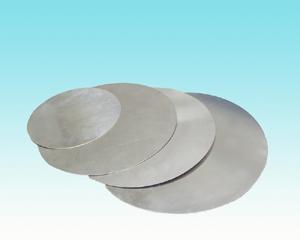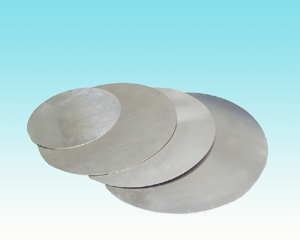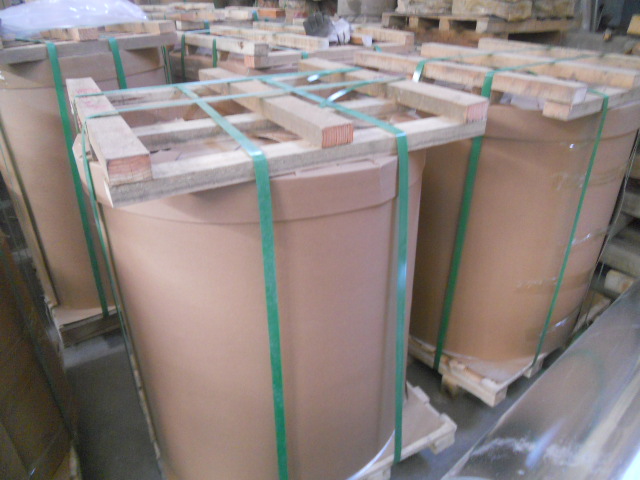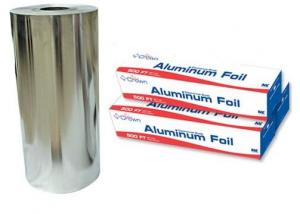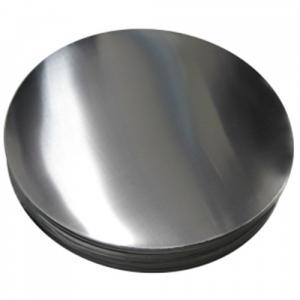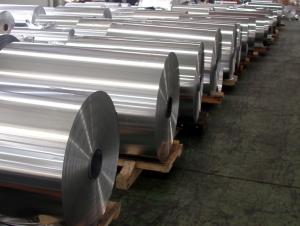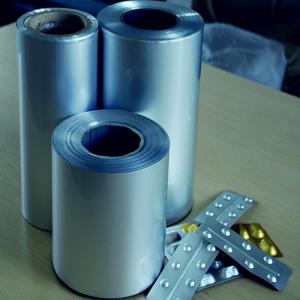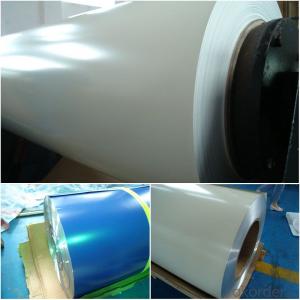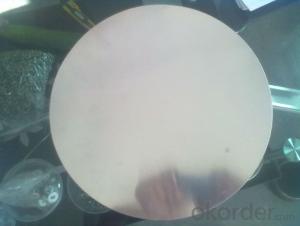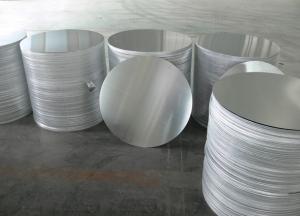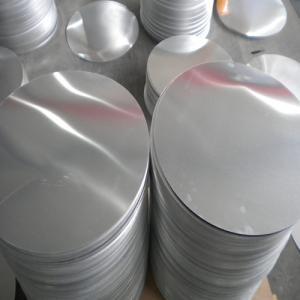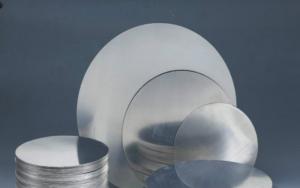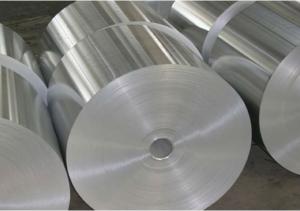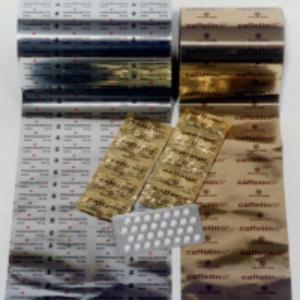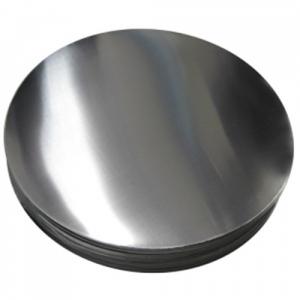Aluminum A1xxx Cold Rolled Circle Alloy CC
- Loading Port:
- Shanghai
- Payment Terms:
- TT or LC
- Min Order Qty:
- 5 m.t.
- Supply Capability:
- 1000 m.t./month
OKorder Service Pledge
OKorder Financial Service
You Might Also Like
1.Structure of Aluminum Cirlces C.C Quality 1xxx Description:
Aluminum circles C.C quality 1xxx is made from aluminum coils 1xxx. Aluminum circles C.C quality 1xxx has great ductility, heat conductivity, anti-corrosion and moisture resistance properties.
Aluminum circles C.C quality 1xxx are widely used for kitchen wares including fried pans, non-sticky pans, cooking pots,hard anodized cookware, pressure cooker and house hold utensils.
2. Aluminum Cirlces D.C Quality 1xxx Quality Specification:
A1XXX Hot Rolled DC Aluminium Circle
1) alloy number 1050 1060 1070 1100 1200 3003.
2) temper available O H12 H14 H16 H18.
3) application: cookware utensil and basin.
4) thickness: 0.5-4.0mm.(+/-0.02mm)
5) diameter: 100-1200mm.(+/-0.5mm)
6) production treatment: cold rolled
7) surface appearance: flat clean surface no scratch, oil dirty and oxidation.
8) cutting edge: neat cutting edge no burrs.
3.Aluminum Circles D.C Quality 3XXX Images
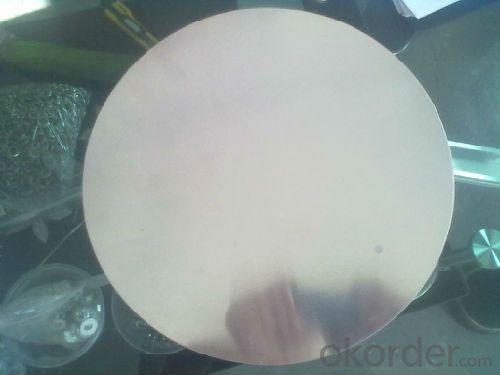
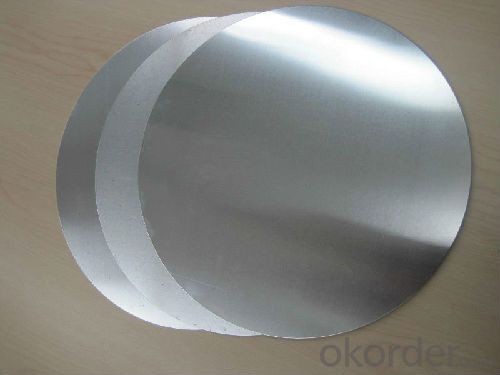
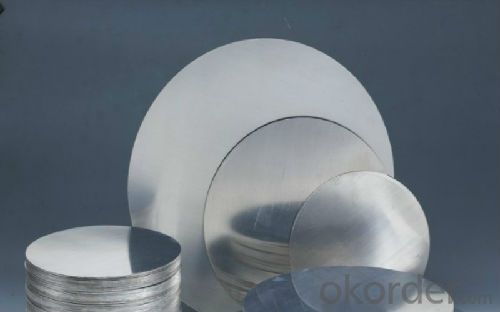
4. FAQ of D.C Quality 1xxx Specification:
A.How to guarantee the quality?
Customers are welcome to our mill to visit and check the products. Besides, we can arrange a third party to test the quality.
B.When will you deliver the products?
The goods will be delivered within 35 days after receiving advanced payment or original L/C.
- Q: Is it possible to utilize recycled aluminum in the production of new products more efficiently than current methods?
- <p>Yes, recycled aluminum can be used more effectively in new products than before. Advances in recycling technology have made it easier to purify and refine aluminum from various sources, including post-consumer waste. This not only conserves natural resources but also reduces energy consumption compared to mining and processing raw bauxite. Additionally, the circular economy approach promotes the design of products that are easier to disassemble and recycle, further enhancing the efficiency of using recycled aluminum in new products.</p>
- Q: Is it possible to utilize aluminum to enhance the durability and efficiency of batteries?
- <p>Yes, aluminum can be used to make batteries more durable and efficient. Aluminum's lightweight, high conductivity, and corrosion resistance make it a favorable material for battery components. In particular, aluminum-air batteries leverage aluminum's ability to provide a high energy density. Additionally, research is ongoing to improve lithium-ion batteries by using aluminum as a component in the anode, which can potentially increase energy storage capacity and lifespan. However, challenges such as aluminum's reactivity and the development of efficient recycling methods must be addressed for widespread adoption in battery technology.</p>
- Q: Is aluminum a suitable material for manufacturing bicycles and other lightweight vehicles?
- <p>Yes, aluminum is a popular material for making bicycles and other lightweight vehicles due to its high strength-to-weight ratio. It is lightweight, durable, and resistant to corrosion, which makes it an excellent choice for components that need to be strong yet not add excessive weight. Aluminum frames are commonly used in bicycles because they offer a good balance between weight, stiffness, and cost. Additionally, aluminum is widely used in the manufacturing of other lightweight vehicles such as electric scooters, small cars, and even aircraft due to its favorable properties.</p>
- Q: Is it safe and practical to use old aluminum cookware that has been stored for a long time?
- <p>Yes, you can reuse old aluminum cookware, but it's important to check its condition first. Look for any signs of damage, such as pits, scratches, or warping, as these can affect the cookware's performance and potentially release aluminum into your food. If the cookware is in good condition, clean it thoroughly and season it if necessary. Remember, aluminum cookware is not suitable for acidic foods or high heat, so use it accordingly to prolong its lifespan and maintain food safety.</p>
- Q: This question asks for an overview of the environmental effects resulting from the production of aluminum.
- <p>Aluminum production has several significant environmental impacts. The process is energy-intensive, contributing to high greenhouse gas emissions, primarily CO2, which exacerbates climate change. It also generates hazardous waste, such as red mud, a byproduct rich in alkaline and heavy metals that can contaminate soil and water if not properly managed. Air pollution is another concern, with emissions of particulates and sulfur dioxide affecting air quality. Additionally, the mining of bauxite, the primary source of aluminum, can lead to deforestation and habitat destruction, impacting biodiversity. Water usage in the production process is substantial, which can strain local water resources. Lastly, the release of fluoride compounds can have detrimental effects on human health and the environment.</p>
- Q: Explain the interaction between aluminum and water, including any chemical reactions or properties.
- <p>Aluminum and water do not react directly under normal conditions. Aluminum is a reactive metal, but it is protected by a thin layer of aluminum oxide that forms on its surface when exposed to air, which prevents further reaction with water. This oxide layer is stable and acts as a barrier, making aluminum resistant to corrosion. However, in certain conditions, such as when aluminum is in contact with water and an electrolyte, it can lead to a process known as electrochemical corrosion. Additionally, aluminum can react with steam at high temperatures to form aluminum oxide and hydrogen gas.</p>
- Q: Is it possible to enhance the efficiency of solar panels by utilizing aluminum?
- <p>Yes, aluminum can be used to improve the efficiency of solar panels. Aluminum is lightweight, corrosion-resistant, and has good thermal conductivity, which can help in dissipating heat and maintaining optimal operating temperatures for solar cells. It is also used in the manufacturing of solar panel frames, providing structural support while reducing the overall weight of the panels. Additionally, some research suggests that using aluminum in the backsheet of solar panels can enhance their durability and efficiency. However, the extent of efficiency improvement depends on various factors, including the specific design and manufacturing process of the solar panels.</p>
- Q: This question asks for innovative applications of recycled aluminum in various industries or everyday life.
- <p>Recycled aluminum is finding new uses in various sectors due to its sustainability and strength. It's being used in the automotive industry to make lighter vehicles, reducing fuel consumption and emissions. In construction, it's used for building materials like window frames and roofing, known for durability and energy efficiency. Recycled aluminum is also employed in the aerospace industry for aircraft parts due to its lightweight and high strength-to-weight ratio. Additionally, it's used in packaging, reducing waste and conserving resources. In electronics, recycled aluminum is used in the manufacturing of various components, contributing to the circular economy.</p>
- Q: This question asks about the energy savings achieved by utilizing recycled aluminum compared to producing new aluminum.
- <p>Using recycled aluminum saves a significant amount of energy. It requires only 5% of the energy needed to produce new aluminum from raw materials. This is because recycling aluminum involves melting the metal, which is much less energy-intensive than the mining, refining, and electrolysis processes required for new aluminum production. By recycling aluminum, we can save up to 95% of the energy that would be used in the production of new aluminum.</p>
- Q: This question asks for methods to prevent the corrosion of pure aluminum when exposed to environmental factors.
- <p>To prevent corrosion of pure aluminum in the environment, one can apply protective coatings such as paints or anodizing, which forms a dense oxide layer on the surface. Additionally, using aluminum alloys that contain elements like copper, magnesium, and silicon can enhance resistance to corrosion. Regular cleaning and maintenance to remove contaminants that may initiate corrosion are also important. In extreme environments, cathodic protection or the use of inhibitors can be employed to further protect aluminum from corrosion.</p>
Send your message to us
Aluminum A1xxx Cold Rolled Circle Alloy CC
- Loading Port:
- Shanghai
- Payment Terms:
- TT or LC
- Min Order Qty:
- 5 m.t.
- Supply Capability:
- 1000 m.t./month
OKorder Service Pledge
OKorder Financial Service
Similar products
Hot products
Hot Searches
Related keywords
